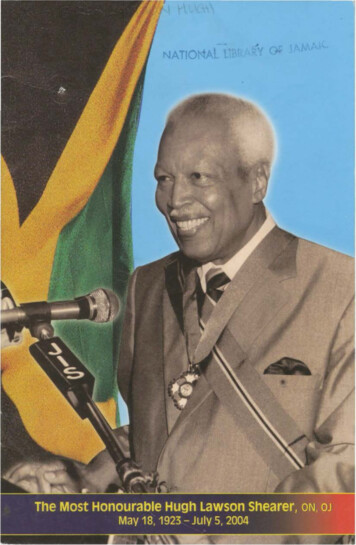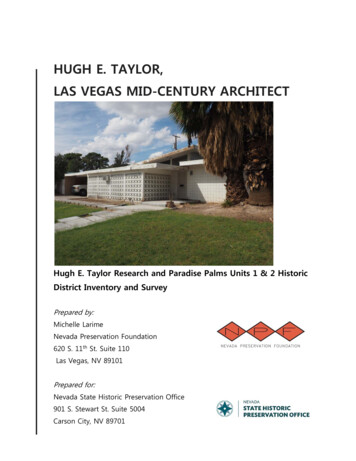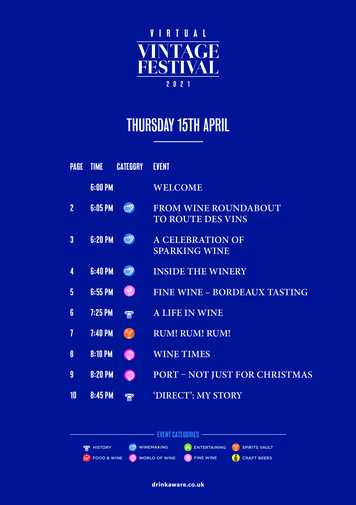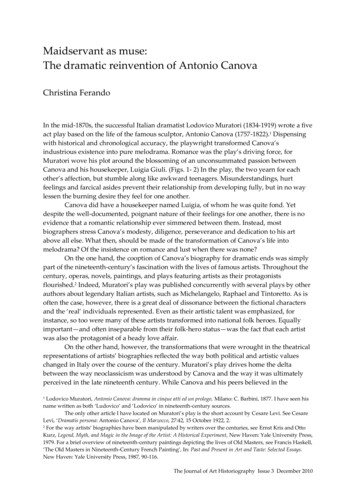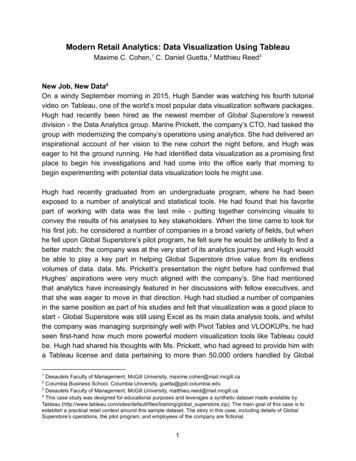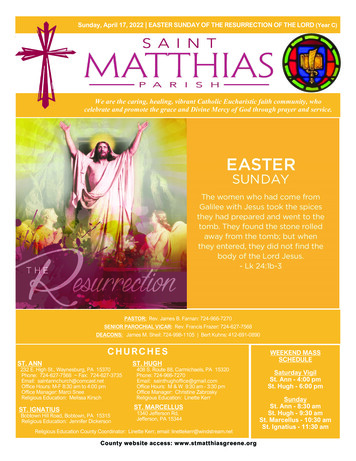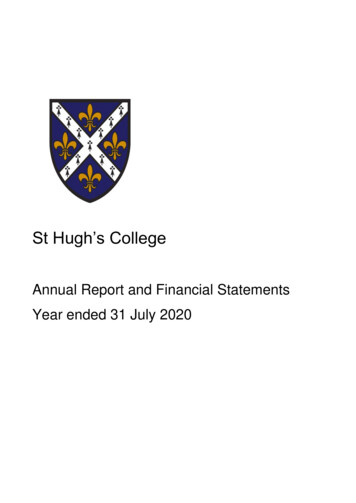
Transcription
St Hugh’s CollegeAnnual Report and Financial StatementsYear ended 31 July 2020
ST HUGH’S COLLEGEAnnual Report and Financial StatementsContentsGoverning Body, Officers and AdvisersPage 1Report of the Governing BodyPage 6Auditor’s ReportPage 17Statement of Accounting PoliciesPage 19Consolidated Statement of Financial ActivitiesPage 24Consolidated and College Balance SheetsPage 25Consolidated Statement of Cash FlowsPage 26Notes to the Financial StatementsPage 27
ST HUGH’S COLLEGEGoverning Body, Officers and AdvisersYear ended 31 July 2020MEMBERS OF THE GOVERNING BODYAcademicCommitteeRiskCommittee Professor A L Harris Professor A W MooreProfessor G S GarnettDr T M KuhnProfessor J T ChalkerResigned as Trustee on 1February 2020Professor K R PlunkettProfessor M B Giles Professor J S GetzlerProfessor L L Wong Professor G A StellardiProfessor P J MitchellProfessor P D McDonaldMrs S J VainkerProfessor S R Duncan Professor R K WestbrookProfessor S PašetaProfessor R G Grainger1 RemunerationCommitteeInvestmentCommitteeDame Elish Angiolini (Principal)FinanceCommitteeThe members of the Governing Body are the College’s charity trustees under charity law. Themembers of the Governing Body who served in office as Governors during the year or subsequentlyare detailed below.
ST HUGH’S COLLEGEProfessor C J StevensProfessor M R MacnairProfessor C Wilson Professor T C B RoodProfessor A Harnden Dr N E R PerkinsProfessor T C PowellProfessor J Martin Professor C Capelli Professor D P MarshallProfessor R PereraMr P R C Marshall Professor E E LeachProfessor G LoutzenhiserProfessor S J ConwayProfessor P BlunsomResigned as Trustee on 31October 2019Professor R BakerProfessor E Mann Dr T Sanders 2RemunerationCommitteeRisk ceCommitteeGoverning Body, Officers and AdvisersYear ended 31 July 2020
ST HUGH’S COLLEGERiskCommittee RemunerationCommitteeAcademicCommitteeResigned 5 November 2019InvestmentCommitteeMs V C StottFinanceCommitteeGoverning Body, Officers and AdvisersYear ended 31 July 2020Dr J Parkin Professor EM Husband Professor C BallentineProfessor D BiroProfessor D Doyle Professor EidenműllerProfessor JérusalemProfessor H OberhauserProfessor E Saupe Professor E Morisi Professor M McMahonProfessor T D Cousins Professor R Cont Dr D F Taylor Professor B KornmannMr H W MyringStarted on 17 February 2020 During the year the activities of the Governing Body were carried out through five committees. Thecurrent membership of these committees is shown above for each Fellow.3
ST HUGH’S COLLEGEMr T P RobertsMr J DiggesMs R EmersonMrs J LambertDame Frances CairncrossDr T PowerMr K KnottAppointed 29 April 2015;Renewed 13 June 2018Appointed 29 April 2015;Renewed 13 June 2018Appointed 13 June 2018 Appointed 1 April 2018Appointed 1 April 2018Appointed 1 March 2020COLLEGE SENIOR STAFFThe senior staff of the College to whom day to day management is delegated are as follows.PrincipalProfessor A MooreVice PrincipalMs V C Stott (until 5 November 2019)BursarMr K Knott (6 November 2020-16 February 2020)Acting BursarMr H W Myring (from 17 February 2020)BursarProfessor R WestbrookSenior TutorMr Jeremy WeeksCollege AccountantMrs Sarah Carthew (until 31 March 2020)Director of DevelopmentMr Bruce Lawrence (from 18 May 2020)Director of DevelopmentMrs Rahele MirnateghiDomestic Bursar4RemunerationCommittee Appointed 19 May 2015;Renewed 14 June 2017Ended 30 September 2019Dame Elish AngioliniRiskCommitteeAcademicCommitteeExternal eGoverning Body, Officers and AdvisersYear ended 31 July 2020
ST HUGH’S COLLEGEGoverning Body, Officers and AdvisersYear ended 31 July 2020COLLEGE ADVISERSInvestment ManagersBlackRock Advisors (UK) LimitedMurray HouseOxford University Endowment ManagementLimited1 Royal Mint CourtKing Charles HouseLondonPark End StreetEC3N 4HHOxfordOX1 1JDSarasin & Partners LLPJuxon House100 St Paul's ChurchyardLondon EC4M 8BUBankersBarclays Bank PLCP O Box 299BirminghamB1 3PFAuditorsCritchleys Audit LLPBeaver House23-38 Hythe Bridge StreetOxfordOX1 2EPCollege AddressSt Margaret’s RoadOxfordOX2 6LEWebsite www.st-hughs.ox.ac.uk5
ST HUGH’S COLLEGEReport of the Governing BodyYear ended 31 July 2020The members of the Governing Body present their Annual Report for the year ended 31 July 2020 under theCharities Act 2011 together with the audited financial statements for the year.REFERENCE AND ADMINISTRATIVE INFORMATIONSt Hugh’s College in the University of Oxford, which is known as St Hugh’s, (“the College”) is an eleemosynarychartered charitable corporation aggregate. The College was opened in 1886 by Miss Elizabeth Wordsworthunder the title of St Hugh’s Hall as a society for women students to study for Oxford examinations. The Collegeregistered with the Charities Commission on 6th January 2011 (registered number 1139717).The names of all members of the Governing Body at the date of this report and of those in office during theyear, together with details of the senior staff and advisers of the College, are given on pages 1 to 5.STRUCTURE, GOVERNANCE AND MANAGEMENTGoverning documentsThe College is governed by its Charter, Statutes and Bylaws dated 28 June 1926 and last amended in February2018.Governing BodyThe Governing Body is constituted and regulated in accordance with the College Statutes, the terms of whichare enforceable ultimately by the Visitor, who was The Rt Hon Lord Brown of Eaton-under-Heywood, PC duringthe year 2019/20. The Governing Body is self-appointing, and has such powers as are conferred on it by theCollege’s Charter and subject thereto and to the Statutes, has the entire direction and management of the affairsof the College.The Governing Body determines the ongoing strategic direction of the College and regulates its administrationand the management of its finances and assets. It meets regularly under the chairmanship of the Principal andis advised by five main committees.Recruitment and training of members of the Governing BodyNew members of the Governing Body are normally recruited through a joint appointment process with theUniversity of Oxford in the case of academics, which includes open advertisement of the posts and aprofessional selection and appointment process. In the case of posts funded solely by the College, recruitmentis also through open advertisement of the post followed by a professional selection and appointment process,including external representatives as appropriate. Recommendations of appointment panels in both cases areconfirmed by paper vote at Governing Body. New members of the Governing Body are inducted into theworkings of the College, including Governing Body policy and procedures, through meetings with the Principal,the Senior Tutor and the Bursar and the provision of a comprehensive set of reference documents. Trusteetraining is also provided by the University for new members of the Governing Body.Remuneration of members of the Governing Body and Senior College StaffMembers of the Governing Body are primarily Fellows and are teaching and research employees of the Collegeor University and they receive no remuneration or benefits from their trusteeship of the College. Those trusteesthat are also employees of the College including the Principal and Bursar receive remuneration for their workas employees of the College, which is based on the advice of the College’s Remuneration Committee. Themembers of the College’s Remuneration Committee are Fellows not in receipt of remuneration from the College6
ST HUGH’S COLLEGEReport of the Governing BodyYear ended 31 July 2020and external advisors. Where possible, remuneration is set in line with that awarded through the national salarysettlement for Higher Education.The remuneration of senior College staff, with the exception of the Principal and Bursar, is set in accordancewith the salary scale adopted for that purpose. The remuneration of the Principal and Bursar is set by theCollege’s Remuneration Committee.Organisational managementThe members of the Governing Body meet nine times a year. The work of developing their policies andmonitoring the implementation of these is carried out by five main Committees: The Finance CommitteeResponsibility for advising the Governing Body on all matters of financial policy and practice, and inparticular on the financial implications of any proposals under consideration; presenting annual statementsof accounts for the preceding year; approval of budgets and review of monthly management accounts;annual review of all charges made by the College; review of policy relating to conferences; review of salariesfor all College employees and others paid by the College. The Investment CommitteeResponsibility for review and provision of advice to the Governing Body, through Finance Committee, onthe investments of the College and the appropriate level of income drawdown. The Academic CommitteeResponsibility for general planning in academic matters; the appropriateness of the existing establishmentof Tutors and Lecturers to the current academic needs of the College; recommending the use of fundsavailable for the purpose of research; presentation to the Governing Body of annual reports from JuniorResearch Fellows and Career Development Fellows; general responsibility for the supervision of studies. The Risk CommitteeResponsibility for the review, monitoring and reporting of major risks to the College, and recommendationto the Governing Body of actions to mitigate those risks. The Remuneration CommitteeReview and recommendation to the Governing Body through Finance Committee, of remuneration andconditions of employment of members of the Governing Body and advice to Finance Committee on theframework of pay and conditions of senior non-academic staff whose detailed pay and conditions aredetermined by the Principal and Bursar.The day-to-day running of the College is delegated to the Principal, supported by the Bursar and the SeniorTutor.Group structure and relationshipsThe College administers many special trusts, as detailed in Notes 17 to 18 to the financial statements.The College also has two wholly owned non-charitable subsidiaries: St Hugh's Conferences Limited, whoseannual profits are donated to the College under the Gift Aid Scheme, and St Hugh's Estates Limited, which7
ST HUGH’S COLLEGEReport of the Governing BodyYear ended 31 July 2020undertakes some of the College’s building works. The trading activities of St Hugh's Conferences Limitedprimarily comprise revenue from the letting of the College facilities when not in use by the College. Thesubsidiaries’ aims, objectives and achievements are covered in the relevant sections of this report.The College is part of the collegiate University of Oxford. Material interdependencies between the Universityand the College arise as a consequence of this relationship.OBJECTIVES AND ACTIVITIESCharitable Objects and AimsThe College’s Objects are: To provide for members of the University of Oxford the protection and training of an Academic House,conducted according to the principles of the Church of England, but with full provision for the liberty of thosewho are not members. To do all such other things as are incidental or conducive to advancing education, learning and research inOxford or elsewhereThe Governing Body has considered the Charity Commission’s guidance on public benefit. In keeping with itsobjects, the College admits as students those who have the highest potential to benefit from the educationprovided by the College and the University and recruits as academic staff those who are able to contribute mostto the academic excellence of the College and University. In the case of both students and academic staff,recruitment is regardless of financial, social, religious or ethnic background.The College’s aims for the public benefit are: To advance education, learning and research, in particular by providing, in conjunction with the Universityof Oxford, an education for 424 undergraduate and 457 graduate students. This education is recognisedinternationally as being of the very highest standard and develops students academically, personally andsocially, preparing them to play a full and effective role in society. In particular, the College provides: teaching facilities and individual or small-group teaching, together with academic, pastoral andadministrative support; IT and other administrative support; welfare services, including the availability of the Chaplain to assist every member of the College; and residential, social, cultural, musical, recreational and sporting facilities to enable students to realise asmuch as possible of their academic and personal potential whilst studying at the College.To advance research by providing: Official Fellowships, Career Development Fellowships, and Junior and Senior Research Fellowships tooutstanding academics, to enable them to develop their research work and disseminate their researchin the public domain; and facilities and grants to assist with the pursuit of research, including grants for attendance at nationaland international academic conferences and assistance with the costs of research trips and researchmaterials.8
ST HUGH’S COLLEGEReport of the Governing BodyYear ended 31 July 2020There are no geographical restrictions to those who may benefit from the College’s aims and objects. Studentsand academic staff of the College are drawn from across the UK and internationally;There are no age restrictions in the College’s objects but students of the College are predominantly between 18and 24 years old; andThere are no religious restrictions in the College’s objects and members of the College have a wide variety offaith traditions or none.In order to raise educational aspiration and attract outstanding applicants who might not otherwise haveconsidered applying to the College, the College operates an extensive outreach programme as part ofUniversity-wide initiatives to widen access. This programme is the responsibility of the Senior Tutor and includesan extensive programme of visits by schools and other groups to the College, open days, events for teachers,as well as visits to schools and guidance and information on the College website for prospective applicants.St. Hugh’s College is committed to anti-racist values and affirms this commitment in a spirit of humility, fullyacknowledging that the College has to do far more to support and protect Black and all BAME students andstaff. The College aims to address and eradicate racial discrimination and racial inequality in its many formswherever it occurs within the College community.The College has a Strategic Framework, which sets out its ambitions for growth under four categories (strategicgoals). These are Academic Vision; Financial Sustainability; Heritage and Estate; and Community. Progresstoward the goals set out in the Strategic Framework is monitored by the Governing Body.The aims set for the College’s subsidiaries are to help finance the achievement of the College’s aims as above.Activities and Objectives of the CollegeThe College’s activities are focused on furthering its stated objects and aims for the public benefit.The focus of the College is strongly academic and students need to satisfy high academic entry requirements.In order to assist undergraduates entitled to financial support, the College provides, through a scheme operatedin common with the University and other Colleges, bursary support for those of limited financial means. For theacademic year 2018/19, the number of awards made was 96 including 19 Crankstart (formerly ‘Moritz-Heyman’)awards. The average value of the awards was 2,411. The scheme is approved by the Office of Fair Accessand provides benefits at a substantially higher level than the minimum OFFA requirement.To support the costs of graduate students, the College provides some financial support. This includes a numberof scholarships to fund fees and living costs and ‘top-up’ funding to fill shortfalls in students’ funding packages,and a grant scheme to assist with the purchase of books and equipment, attendance at conferences and travelgrants. The total amount expended by the College in 2019/20 for this purpose was 105,353.The College also makes awards for academic development and has various scholarships and prizes availableto reward academic excellence. During the year the College awarded 24,144 to its Undergraduates.In addition to its other programmes, the College operates a scheme for all students in financial hardship andprovides access to hardship schemes operated by the University. For the academic year 2019/20 the Collegeawarded 37,843 of hardship loans and grants and provided 95,086 of free vacation residence. A programmeto encourage legacies to be made to the College is in place and annual fundraising campaigns focus on theprovision of support for students suffering financial hardship.9
ST HUGH’S COLLEGEReport of the Governing BodyYear ended 31 July 2020Value for MoneyThe Governing Body of St Hugh’s College has considered the processes in place during the financial periodending 31 July 2020 and is satisfied that, with regard to public and publically accountable funds, the processesfor achieving economy, efficiency and effectiveness were appropriate.In making this confirmation, members of the Governing Body are cognisant of their obligations as Charitytrustees to ensure that funds are correctly applied, in line with the objects of the College.ACHIEVEMENTS AND PERFORMANCEThe COVID-19 pandemic has had a significant and far-reaching impact on all aspects of College life. Whenlockdown measures were announced by the Government, all students who were able to were advised to travelhome, and the majority of staff stayed away from College. St Hugh’s did not see the return of its student bodyfor the remainder of the academic year and most of on-site activity ceased. The College operated with a skeletonstaff servicing the site and supporting the small minority of students who remained.During this significant period of upheaval St Hugh’s adapted incredibly effectively to online teaching and remoteworking in order that it could continue to provide an extremely high level of education to undergraduate studentsand to offer an environment for research and teaching, alongside providing pastoral and administrative supportfor undergraduate students, graduate students, Fellows, lecturers and tutors.Teaching and the normal academic function of the College moved fully online for Trinity Term 2020. Studentsand tutors adapted extraordinarily well to the considerable challenges: among them, video call tutorials andmeetings, dealing with multiple time zones; reading lists of digital materials; the use of IT equipment to replacethe white-board function; a digital and physical postal service from the Library; virtual Open Day videos; andremote examinations.The Coronavirus pandemic continues into 2020/21 and the College will feel both the ongoing financial andsocietal impacts well beyond the next academic year, but it looks forward to welcoming back the student bodyfor the new academic year and St Hugh’s is reassured that it is able to adapt and change to the circumstancesas they present themselves.Degrees 2019-20115 students completed undergraduate degrees; around 170 graduate students completed taught degrees and29 completed research degrees.Student Recruitment and Widening ParticipationThe College continues to work with schools and colleges to encourage able students to consider Oxford and StHugh’s. Tutors and current students work together with the College’s Outreach Officer to visit schools andcolleges and arrange visits to St Hugh’s. This year we have been pleased with our progress in buildingrelationships with hard-to-contact schools, and developing a multi-layered approach to outreach work. St Hugh’scoordinates a broad range of outreach and recruitment activities to encourage applications from academicallyable students from all backgrounds, particularly those traditionally under-represented at the University. Activitiesinclude three annual open days and visits to and from schools in the College’s link region (Kent), featuringadmissions talks, academic taster sessions and College tours. The College also continues to develop itscollaborations with partners such as Target Oxbridge, The Brilliant Club, Oxford Pathways, and Universify, tobroaden the scope of its outreach and recruitment activities. The College continues to work with ‘Teach First’,offering bursaries to St Hugh’s students and alumni who join the programme and encouraging them to return toSt Hugh’s with their pupils.10
ST HUGH’S COLLEGEReport of the Governing BodyYear ended 31 July 2020Early-Career DevelopmentThe College continues its drive to recruit early-career academics. This year, we recruited to the Mary R EmersonCareer Development Fellowship in Engineering Science; the post, which includes an outreach element, will befilled from October 2020. The Development Office continues to raise funds to support further posts of this kind.Research EnvironmentThe College continues to provide funding and assistance to its Fellows to enable them to continue to produceworld-class research, ranging from attendance at conference events to providing research assistance, periodsof sabbatical leave for specific projects, and the opportunity to hold academic networking events in College. Aseed-donation has enabled us to extend the range of these grants. This year also saw the first Belcher VisitingFellow in Victorian Studies, Professor Martin Hewitt; the second Belcher Visiting Fellow will join the College inJanuary 2021, and the three subsequent Visiting Fellows have already been secured.LibraryAlthough the Library was closed once Coronavirus lockdown restrictions were imposed, the Librarian continuedto work closely with Fellows to strengthen and update the collection with relevant textbooks and other key worksfor undergraduate and graduate students. Some subject areas have seen an increase in spend due to the arrivalof new Fellows.Noteworthy progress has been made with the reclassification project and new refinements in the classificationsystem have improved users’ ease of access. The project is currently focussed on the Social Sciences section.The Library continues to strive to improve its services for all students. The upgrade of the self-issue and securitysystem was implemented in 2019/20 and enables the Library to provide enhanced book circulation andmanagement as well as a much fuller service to readers.When it reopens for the new academic year and providing the Government restrictions allow, the Library willcontinue to hosts termly exhibitions which are opportunities to showcase material from the archive and the rarebooks collection.ChapelThe Chapel continues to provide for religious worship, and offers an opportunity for students to join its vibrantChoir. The Choir contains approximately twenty-five undergraduate, graduate, and staff singers each year,presenting a popular extracurricular activity, and a support to the Chapel’s main services and events. A smallerChapel Chamber Choir has recently been assembled, providing a well-trained sub-group of singers for specialoccasions.A Chapel Music Tutor gives overall musical guidance, especially to our three Organ Scholars and four ChoralAward holders. A professional voice teacher is in regular engagement with our singers.The main Chapel services are Choral Evensongs, with guest speakers on Sunday evenings during Full Term at6.15pm, followed by drinks and a meal in the Dining Hall. A wide variety of speakers visit us from the University,religious sectors, and the national media, drawing strong crowds.Occasional services including Eucharists, Baptisms, and Weddings occur regularly. The largest single event ofeach academic year continues to be the annual Advent Carol service, which requires a move to MaplethorpeHall for a capacity crowd.11
ST HUGH’S COLLEGEReport of the Governing BodyYear ended 31 July 2020While the Chapel is historically a Church of England foundation, careful efforts to welcome and cater for allCollege constituents, regardless of viewpoint, continue to be given increasing attention. Services with theUniversity Catholic Chaplaincy, and interfaith events with speakers from non-Christian religions take place eachterm. Interfaith services with Muslim, Jewish, and other religious communities have proven to be particularlypopular, with substantial crowds in attendance who dine in College afterwards. A Multi-faith Prayer and QuietRoom exists to complement the Chapel, offering a space for those of any religious viewpoint or none analternative room for prayer, contemplation, or healthy quiet time.Recent popular additions to Chapel activities have included College fine artists’ exhibitions and musicalconcerts. All financial gifts from weekly congregations are given to a different registered charity at the conclusionof each Term.During the COVID-19 pandemic, which especially affected Trinity Term 2020, the Chapel quickly adapted andmoved all of its usual services to pre-recorded online versions easily located on its dedicated Facebook pageand YouTube channel.DevelopmentThe College’s development work, alumni engagement activities and events programme have been severelytransformed and impacted due to the COVID-19 pandemic, associated travel restrictions and social distancingmeasures. Pre-pandemic, fundraising from our major donors and prospects overseas remained a priority for theFuture Project until it was postponed earlier this year to be reviewed in one year’s time. The November 2019Direct Mail campaign raised a record amount of over 60,000 whilst the annual telethon, which raised over 170,000 last year, was cancelled this year due to the pandemic. In May, the College welcomed our newDirector of Development following the departure of the previous Director in March. Despite the pandemic, theDevelopment Team has continued to engage and fundraise from alumni and friends of the College withsignificant gifts having been received to support the Discretionary Fund, Chemistry and Modern Languages. Wealso received further instalments of donations to fund the Oxford University China Centre, the Fangda Law CDF,Graduate Scholarships and Outreach. The COVID-19 College Support Fund, launched in May, has raised over 33,000 from 183 donors.Successful in-person events were held until March 2020 with the College hosting well-attended Reunion Dinnersfor those who matriculated between 1992-95 and 2002-05, in addition to annual events including the JubileeLunch, Law Society Dinner and Donors’ Dinner. Other successes included the latest instalment of the BusinessBreakfast Series, the Bletchley Park Symposium co-organised with the Alumni Association Committee and visitsto the Tutankhamun exhibition at the Saatchi Gallery and the ‘Troy: myth and reality’ exhibition at the BritishMuseum. St Hugh’s also held its latest regional event for alumni in York in February 2020. In-person eventsfrom April were cancelled or postponed due to COVID-19, including the Garden Party, and we do not plan onresuming in-person events for the remainder of 2020. As a result, we have moved our events programme onlinewhere possible and enhanced our online engagement and communications. We hosted our first ‘Virtual’Afternoon Tea for Donors in July for a record number of attendees. We were also delighted that ProfessorMichael McMahon, Professor of Economics and Senior Research Fellow at St Hugh's, joined us to give anonline lecture on 'Covid and the Economy' in July which was attended by over 170 alumni and friends, a recordnumber for this format of event. Alumni have been kept informed about College news and online events throughemails and increased activity on the College’s social media accounts.Conferences and Bed & BreakfastThe College’s commercial activities started off successfully with a plan for increased revenue from SummerSchool contracts as well as repeat bookings. The budget forecast looked promising and as of March 2020 theCollege was not far from reaching its annual target. Unfortunately, due to the COVID-19 pandemic and12
ST HUGH’S COLLEGEReport of the Governing BodyYear ended 31 July 2020subsequent Government restrictions, all of the commercial bookings for the remainder of the year were eithercancelled or deferred. The Conference Team has been working hard to offer new dates to existing clientswherever possible. This will mostly be reflected in the 2020/21 Annual Report.The College is hopeful that its strong core relationships with its clients will support future commercial income.The College is working hard to ensure that the College, as a community, continues to be as safe, warm andwelcoming as ever and it continues to work hard towards its commercial sustainability and to welcoming guestsand visitors once again, as and when allowed.At this stage it is anticipated that conferences and events will take place again from Easter 2021 onwards.However, this will very much depend on Government restrictions that are in place and the needs of the Collegeat any particular time.CateringThe Catering department continues to deliver excellent quality meals for St Hugh’s students, Fellows and staff,as well as for visitors. The feedback on service and quality continues to be positive with the Team looking toenhance the student experience wherever possible by working closely with the student representatives. TheWordsworth Tea Room continues to be very popular amongst College students and the China Centre staff.The contract with a new food procurement agency has proved to be a great success in the first couple of yearsof the agreement and in light of this, the College has extended the contract for another couple of years. Thefirst six month of 2019-2020, delivered over 5% sav
The College administers many special trusts, as detailed in Notes 17 to 18 to the financial statements. The College also has two wholly owned non-charitable subsidiaries: St Hugh's Conferences Limited, whose annual profits are donated to the College under the Gift Aid Scheme, and St Hugh's Estates Limited, which
